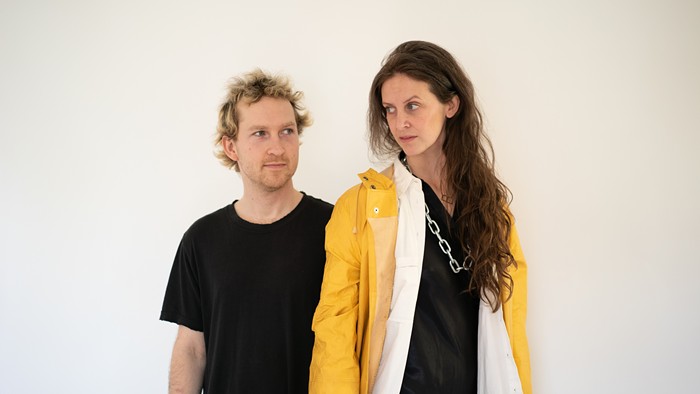IN THE WEEKS that followed my first listen to 2010's Epic, Sharon Van Etten became very much like a friend—or, rather, her songs did. Not the kind of friend that could offer blithe comfort through wisdom or reassurance, but a friend that sounded just as lost as I felt, a friend going through the same turmoil and confusion that I kept just barely contained under the surface. Epic's seven songs were quilted together from those exact ragged patches of heartache I'd been obsessively rolling back and forth between my fingertips. They were terrifying and glorious and addictive to listen to, and they immediately fused themselves to my subconscious, giving voice—and, therefore, light—to the dark, lurking feelings rattling around down there in the dim.
It scarcely mattered that Van Etten's back-story had virtually nothing in common with mine (other than some shared geography around the edges of Nashville and New York City). Falling into a bad relationship, she became estranged from her family and was discouraged from writing and performing. The boyfriend is since gone, she's reconnected with her family, and she's obviously found her way as a musician, possessing a voice that's harrowing, haunting, and unforgettable. If a narrative needs to be ascribed to her discography, her first album, Because I Was in Love, is the document of walking away and standing up for herself, while Epic is a scary look back into that abyss, confronting the reasons and compulsions that had drawn her into that tumultuous time.
Now there's a third record, Tramp, produced by the National's Aaron Dessner and recorded piecemeal over an extended period of many months. "I felt a little scattered doing this record," Van Etten admits. "We didn't have a preconceived notion of what the record should sound like. One thing that Aaron and I have in common is that we're mostly self-taught. In that way, we have a lot of freedom in playing. He usually records so he has lots and lots and lots of tracks, and then pares it down and tries different combinations after pulling things back. Whereas I'm the exact opposite: I start with the bare minimum and then move on—and then listen back and see what needs to be added. So in that way, we met in the middle, which helped, because I'd have to rein him in a little bit and he'd have to push me to do more."
With nearly double Epic's number of songs, Tramp has been framed as Van Etten's "I have arrived" record; it's on a hot-shit label (Jagjaguwar), and it features musicians from the indie-rock glitterati (Beirut, Wye Oak, the Walkmen)—and it confounded me, initially. I kept looking for that point of entry, that lyric that I could twist to interpret precisely how I felt, that wash of song that hits so strong and with such force, the only thing to do is turn the speakers up and lie there in the dark, listening.
I found it, eventually. It wasn't at the start of the record—the striking one-two-three punch of "Warsaw," "Give Out," and "Serpents"—where I expected it to be. ("There are a few in-your-face songs," Van Etten says. "I wanted to get people's attention at the beginning of the record, for sure.") Rather, I found it in "Leonard," and the heartsick lines "I am bad/At loving you," but set to a melody that rises and falls like easy breath, resulting in a song of warmth and confidence and comfort. I found it again in "Ask," a song that bears the knife-turning refrain, "It hurts too much to laugh about it." And again in the slow build of "I'm Wrong," which traverses from queasy, hallucinatory doubt to a crescendo of triumph.
Song by song, Tramp slowly fell into focus—coming after Epic's abruptness, perhaps it may have been too much to digest all at once. Tramp feels more like a collection of short stories, and if some of the wide-eyed, compelling panic is gone, in its place is the reassurance and wisdom Epic so sorely yearned for. Van Etten has grown up and moved on—and, truthfully, so have I.



















